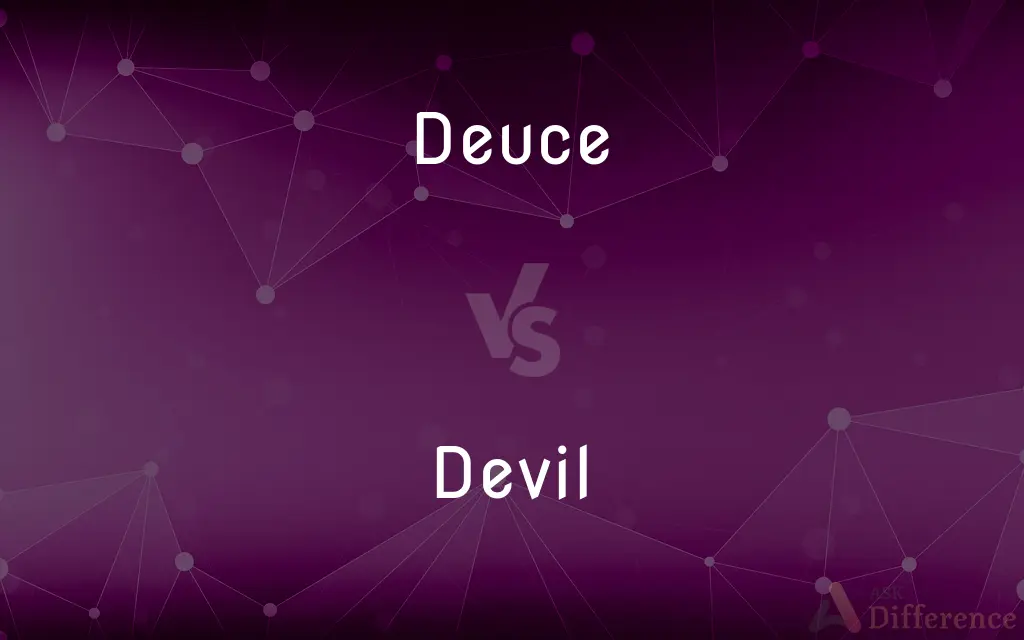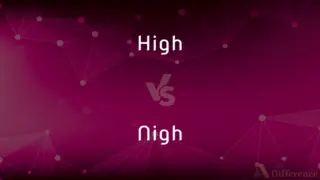Deuce vs. Devil — What's the Difference?
By Urooj Arif & Maham Liaqat — Updated on April 1, 2024
Deuce refers to a tie in a game's score, needing one side to score two successive points to win, while Devil represents evil in many religious beliefs.

Difference Between Deuce and Devil
Table of Contents
ADVERTISEMENT
Key Differences
Deuce in sports, especially tennis, signifies a tied score where each player or team needs two consecutive points to win the game, indicating a crucial, often high-pressure, moment in the match. On the other hand, the Devil is a central figure in many religions and mythologies, symbolizing the embodiment of evil, temptation, and the adversary of good.
While deuce is a specific term used within the context of scoring in games and sports, emphasizing the competition and fairness of play, the concept of the Devil encompasses theological and moral dualities, representing the ongoing battle between good and evil within religious narratives.
Deuce implies a moment of equality and balance in a competitive situation, where neither competitor has a distinct advantage, and the outcome is uncertain. Whereas, the Devil is often depicted as a figure of imbalance, seeking to disrupt harmony and moral order, often through deceit or temptation.
In the realm of language and culture, deuce is relatively neutral, associated primarily with the rules and conduct of games. The Devil, however, carries a weight of cultural and historical significance, embodying complex concepts of morality, sin, and redemption across various cultures.
Deuce represents a point of tension and excitement in games, a moment where skill, strategy, and sometimes luck, converge to break the tie. In contrast, the Devil is seen as a source of conflict and challenge on a moral and spiritual level, urging individuals to confront and overcome their inner demons or external temptations.
ADVERTISEMENT
Comparison Chart
Meaning
A tied score in sports requiring two consecutive points to win.
A supernatural being embodying evil and temptation.
Context
Sports and games.
Religion, mythology, and moral philosophy.
Symbolism
Competition, fairness, and balance.
Evil, temptation, and moral struggle.
Cultural Significance
Neutral, related to game rules.
Deep, with varied representations across cultures.
Emotional Connotation
Tension and excitement in a competitive moment.
Conflict, fear, and moral contemplation.
Compare with Definitions
Deuce
Tie in Sports.
The match reached deuce, increasing the suspense among the spectators.
Devil
Embodiment of Evil.
The Devil is often depicted with horns and a tail in folklore.
Deuce
Equal Score.
Achieving deuce requires both skill and concentration.
Devil
Source of Temptation.
In many stories, the Devil tempts people away from the path of righteousness.
Deuce
Moment of Balance.
At deuce, the game's outcome hangs in balance.
Devil
Moral Struggle.
Facing one's inner devils can be a profound moral struggle.
Deuce
Competition Point.
They fought hard to bring the game to deuce.
Devil
Symbol of Chaos.
In literature, the Devil often represents chaos and disorder.
Deuce
Critical Moment.
Reaching deuce can either break or make a player’s resolve.
Devil
Religious Antagonist.
The Devil is considered the primary adversary in several religions.
Deuce
The two on dice or playing cards
A doctored die having two deuces
Devil
A devil is the personification of evil as it is conceived in various cultures and religious traditions. It is seen as the objectification of a hostile and destructive force.It is difficult to specify a particular definition of any complexity that will cover all of the traditions, beyond that it is a manifestation of evil.
Deuce
The score of 40 all in a game, at which each player needs two consecutive points to win the game
A marathon game that went to eleven deuces
The Swede pegged him back to deuce from 40-love
Devil
Often Devil In many religions, the major personified spirit of evil, ruler of Hell, and foe of God. Used with the.
Deuce
Used as a euphemism for ‘devil’ in expressions of annoyance, impatience, surprise, etc.
What the deuce are you trying to do?
How the deuce are we to make a profit?
Devil
A subordinate evil spirit; a demon.
Deuce
A playing card having two spots or the side of a die bearing two pips.
Devil
A wicked or malevolent person.
Deuce
A cast of dice totaling two.
Devil
A person
A handsome devil.
The poor devil.
Deuce
A tied score in tennis in which each player or side has 40 points, or 5 or more games, and one player or side must win 2 successive points to win the game, or 2 successive games to win the set.
Devil
An energetic, mischievous, daring, or clever person.
Deuce
The devil
"Love is a bodily infirmity ... which breaks out the deuce knows how or why" (William Makepeace Thackeray).
Devil
(Printing) A printer's devil.
Deuce
An outstanding example, especially of something difficult or bad
A deuce of a family row.
Devil
A device or machine, especially one having teeth or spikes and used for tearing.
Deuce
A severe reprimand or expression of anger
Got the deuce for being late.
Devil
An outstanding example, especially of something difficult or bad
Has a devil of a temper.
Deuce
Used as an intensive
What the deuce were they thinking of?.
Devil
A severe reprimand or expression of anger
Gave me the devil for cutting class.
Deuce
To make the score of (a tennis game or set) deuce.
Devil
(Informal) Used as an intensive
Who the devil do you think you are?.
Deuce
(cards) A card with two pips, one of four in a standard deck of playing cards.
Devil
To season (food) heavily.
Deuce
(dice) A side of a die with two spots.
Devil
To annoy, torment, or harass.
Deuce
(dice) A cast of dice totalling two.
Devil
To tear up (cloth or rags) in a toothed machine.
Deuce
The number two.
Devil
(theology) The chief devil; Satan.
Deuce
A piece of excrement.
Devil
(theology) An evil creature, the objectification of a hostile and destructive force.
Deuce
A two-year prison sentence.
Devil
(folklore) A fictional image of a man, usually red or orange in skin color; with a set of horns on his head, a pointed goatee and a long tail and carrying a pitchfork; that represents evil and portrayed to children in an effort to discourage bad behavior.
Deuce
A hand gesture consisting of a raised index and middle fingers, a peace sign.
Devil
The bad part of the conscience; the opposite to the angel.
The devil in me wants to let him suffer.
Deuce
(tennis) A tied game where either player can win by scoring two consecutive points.
Devil
A wicked or naughty person, or one who harbors reckless, spirited energy, especially in a mischievous way; usually said of a young child.
Those two kids are devils in a toy store.
Deuce
(baseball) A curveball.
Devil
A thing that is awkward or difficult to understand or do.
That math problem was a devil.
Deuce
A '32 Ford.
Devil
Hell.
What in the devil is that?
What the devil is that?
She is having a devil of a time fixing it.
You can go to the devil for all I care.
Deuce
(in the plural) 2-barrel (twin choke) carburetors in the phrase 3 deuces: an arrangement on a common intake manifold.
Devil
A person, especially a man; used to express a particular opinion of him, usually in the phrases poor devil and lucky devil.
Deuce
A table seating two diners.
Devil
A printer's assistant.
Deuce
(epithet) The Devil, used in exclamations of confusion or anger.
Devil
(India) A poltergeist that haunts printing works.
Deuce
Two; a card or a die with two spots; as, the deuce of hearts.
Devil
A dust devil.
Deuce
A condition of the score beginning whenever each side has won three strokes in the same game (also reckoned "40 all"), and reverted to as often as a tie is made until one of the sides secures two successive strokes following a tie or deuce, which decides the game.
Devil
A barren, unproductive and unused area.
Devil strip
Deuce
The devil; a demon.
Devil
(cookery) A dish, as a bone with the meat, broiled and excessively peppered; a grill with Cayenne pepper.
Deuce
A tie in tennis or table tennis that requires winning two successive points to win the game
Devil
A machine for tearing or cutting rags, cotton, etc.
Deuce
The cardinal number that is the sum of one and one or a numeral representing this number
Devil
A Tasmanian devil.
Deuce
A word used in exclamations of confusion;
What the devil
The deuce with it
The dickens you say
Devil
An endurance event where riders who fall behind are periodically eliminated.
Deuce
One of the four playing cards in a deck that have two spots
Devil
(nautical) devil seam: {{ngd}}
Devil
To make like a devil; to invest with the character of a devil.
Devil
To annoy or bother.
Devil
To work as a ‘devil’; to work for a lawyer or writer without fee or recognition.
Devil
To prepare (food) with spices, making it spicy:
Devil
To grill with cayenne pepper; to season highly in cooking, as with pepper.
Devil
To finely grind cooked ham or other meat with spices and condiments.
Devil
To prepare a sidedish of shelled halved boiled eggs to whose extracted yolks are added condiments and spices, which mixture then is placed into the halved whites to be served.
She's going to devil four dozen eggs for the picnic.
Devil
The Evil One; Satan, represented as the tempter and spiritual of mankind.
[Jesus] being forty days tempted of the devil.
That old serpent, called the Devil, and Satan, which deceiveth the whole world.
Devil
An evil spirit; a demon.
A dumb man possessed with a devil.
Devil
A very wicked person; hence, any great evil.
Have not I chosen you twelve, and one of you is a devil?
Devil
An expletive of surprise, vexation, or emphasis, or, ironically, of negation.
The devil a puritan that he is, . . . but a timepleaser.
The things, we know, are neither rich nor rare,But wonder how the devil they got there.
Devil
A dish, as a bone with the meat, broiled and excessively peppered; a grill with Cayenne pepper.
Men and women busy in baking, broiling, roasting oysters, and preparing devils on the gridiron.
Devil
A machine for tearing or cutting rags, cotton, etc.
Devil
To make like a devil; to invest with the character of a devil.
Devil
To grill with Cayenne pepper; to season highly in cooking, as with pepper.
A deviled leg of turkey.
Devil
(Judeo-Christian and Islamic religions) chief spirit of evil and adversary of God; tempter of mankind; master of Hell
Devil
One of the evil spirits of traditional Jewish and Christian belief
Devil
A word used in exclamations of confusion;
What the devil
The deuce with it
The dickens you say
Devil
A rowdy or mischievous person (usually a young man);
He chased the young hellions out of his yard
Devil
A cruel wicked and inhuman person
Devil
Cause annoyance in; disturb, especially by minor irritations;
Mosquitoes buzzing in my ear really bothers me
It irritates me that she never closes the door after she leaves
Devil
Coat or stuff with a spicy paste;
Devilled eggs
Common Curiosities
What is deuce in tennis?
Deuce in tennis is a score where both players have won three points each, and one player needs to score two consecutive points to win the game.
Is the Devil always depicted as evil?
In most religious and cultural narratives, the Devil is depicted as a symbol of evil and temptation, although interpretations can vary.
Who is the Devil in religious texts?
The Devil is often portrayed as the embodiment of evil and the main antagonist in various religious texts.
How does one win from deuce in a game?
From deuce, a player must win two consecutive points to win the game.
Can reaching deuce be strategic in games?
Yes, players may use strategy to reach deuce to break their opponent's momentum or conserve energy for crucial points.
Can deuce apply to sports other than tennis?
Yes, deuce can apply to other sports with point-based scoring systems, indicating a tie that requires a specific number of consecutive points to win.
How do players react to reaching deuce?
Players may feel increased pressure at deuce, as it represents a critical moment where the game's outcome is at stake.
What symbolizes a deuce in tennis?
The term "deuce" itself signifies the tie, with no specific physical symbol used in the sport.
Why is the Devil important in religious stories?
The Devil serves as a foil to goodness, testing faith and morality, and is central to the theme of spiritual struggle.
How do cultures depict the Devil differently?
Depictions of the Devil vary widely, from a fallen angel to a mischievous trickster, depending on cultural and religious contexts.
Do all sports have a concept similar to deuce?
Not all sports have a concept similar to deuce; it's specific to certain games with point-based scoring systems.
How does the concept of deuce affect a player's strategy?
Knowing that a game can reach deuce may influence a player's strategy, encouraging them to focus on winning points more decisively to avoid the tie-break situation.
Is there a way to avoid deuce in tennis?
Adopting aggressive or strategic play can help a player win points before reaching deuce, although it's not always avoidable.
What lessons do stories about the Devil teach?
Stories about the Devil often teach about the consequences of succumbing to temptation and the value of virtue and resilience.
Is the Devil always a male figure?
While traditionally depicted as male, interpretations and representations of the Devil's gender can vary across different cultures and stories.
Share Your Discovery

Previous Comparison
Hie vs. Hin
Next Comparison
High vs. NighAuthor Spotlight
Written by
Urooj ArifUrooj is a skilled content writer at Ask Difference, known for her exceptional ability to simplify complex topics into engaging and informative content. With a passion for research and a flair for clear, concise writing, she consistently delivers articles that resonate with our diverse audience.
Co-written by
Maham Liaqat














































